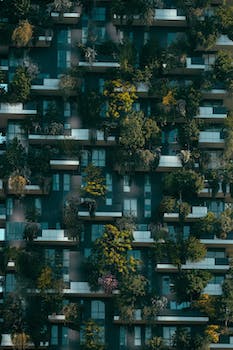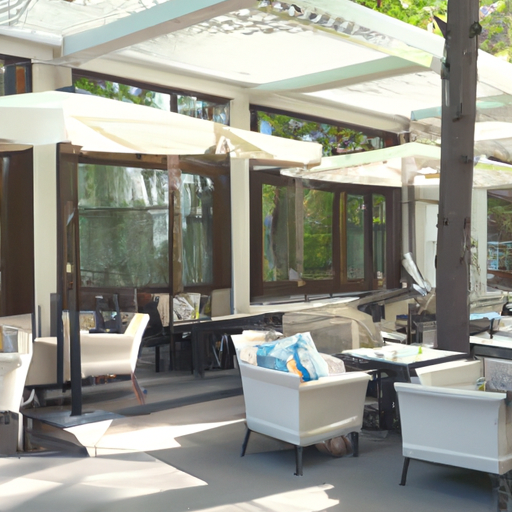Balancing Aesthetics and Functionality: Key Design Principles for a Modern Guest Complex
The role of design in creating a modern complex that’s perfect for guests cannot be overstated. A well-designed guest complex not only provides a comfortable and enjoyable experience for its visitors but also contributes to the overall success of the establishment. Balancing aesthetics and functionality is a crucial aspect of designing such a space, and this article will explore the key design principles that should be considered when creating a modern guest complex.
First and foremost, it is essential to understand the needs and preferences of the target audience. A guest complex that caters to business travelers, for example, will have different requirements than one that is designed for families on vacation. By identifying the specific needs of the intended guests, designers can create spaces that are both visually appealing and highly functional.
One of the most important aspects of designing a modern guest complex is the efficient use of space. In today’s fast-paced world, people are increasingly seeking out spaces that are not only visually appealing but also practical and efficient. This means that designers must carefully consider how each area of the complex will be used and ensure that there is a seamless flow between different spaces. This can be achieved through the use of open floor plans, multi-functional furniture, and clever storage solutions.
Another key design principle is the incorporation of natural elements. Research has shown that exposure to nature can have a positive impact on our mental and physical well-being, making it an essential consideration when designing spaces for guests. This can be achieved through the use of natural materials, such as wood and stone, as well as the incorporation of plants and greenery throughout the complex. Additionally, designers should consider the importance of natural light and ensure that windows and skylights are strategically placed to maximize the amount of sunlight that enters the space.
The choice of color palette is also an important aspect of creating a modern guest complex. Colors can have a significant impact on our mood and emotions, and it is essential to choose a palette that is both visually appealing and conducive to relaxation. Neutral tones, such as whites, grays, and beiges, are often used in modern design as they create a sense of calm and serenity. However, designers should not be afraid to incorporate pops of color through the use of artwork, textiles, and other decorative elements, as this can add interest and personality to the space.
Technology is another crucial consideration when designing a modern guest complex. Today’s guests expect to have access to the latest technology, and it is essential to incorporate this into the design of the space. This can include high-speed Wi-Fi, smart TVs, and integrated sound systems, as well as more advanced features such as keyless entry systems and automated lighting controls.
Finally, it is essential to consider the sustainability of the design. With growing concerns about the impact of our actions on the environment, it is more important than ever to create spaces that are not only visually appealing but also environmentally friendly. This can be achieved through the use of energy-efficient appliances and lighting, as well as the incorporation of sustainable materials and eco-friendly practices throughout the design process.
In conclusion, the role of design in creating a modern guest complex that is perfect for guests is multifaceted and requires a careful balance of aesthetics and functionality. By considering the needs of the target audience, making efficient use of space, incorporating natural elements, choosing an appropriate color palette, integrating technology, and prioritizing sustainability, designers can create a space that is not only visually appealing but also highly functional and enjoyable for guests.
Integrating Technology and Sustainability: Designing a Modern Complex for the Discerning Guest

The role of design in creating a modern complex that’s perfect for guests cannot be overstated. In today’s fast-paced world, where technology and sustainability are increasingly becoming intertwined, it is essential for architects and designers to create spaces that cater to the discerning guest. This means not only providing aesthetically pleasing and functional spaces but also incorporating cutting-edge technology and sustainable practices to ensure a seamless and enjoyable experience for guests.
One of the key aspects of designing a modern complex is the integration of technology. This can range from the use of smart devices and automation systems to enhance the guest experience to the incorporation of renewable energy sources and energy-efficient systems to reduce the complex’s environmental impact. By integrating technology into the design process, architects and designers can create spaces that are not only visually appealing but also highly functional and efficient.
For instance, the use of smart devices and automation systems can greatly enhance the guest experience by providing personalized services and amenities. This can include everything from automated check-in and check-out processes to personalized lighting and temperature controls in guest rooms. By incorporating these technologies into the design of a modern complex, guests can enjoy a more seamless and convenient experience, ultimately leading to increased satisfaction and loyalty.
In addition to enhancing the guest experience, the integration of technology can also play a significant role in improving the overall efficiency and sustainability of a modern complex. For example, the use of renewable energy sources, such as solar panels or wind turbines, can help to reduce the complex’s reliance on non-renewable energy sources and decrease its carbon footprint. Similarly, the incorporation of energy-efficient systems, such as LED lighting and smart thermostats, can help to reduce energy consumption and lower operating costs.
Another crucial aspect of designing a modern complex for the discerning guest is the incorporation of sustainable practices and materials. This can include everything from the use of eco-friendly building materials and construction techniques to the implementation of green landscaping and water conservation measures. By prioritizing sustainability in the design process, architects and designers can create spaces that not only look and feel good but also have a minimal impact on the environment.
For example, the use of eco-friendly building materials, such as reclaimed wood or recycled metal, can help to reduce the environmental impact of a modern complex by minimizing the need for new resources and reducing waste. Additionally, the implementation of green landscaping techniques, such as the use of native plants and permeable paving materials, can help to conserve water and support local ecosystems.
In conclusion, the role of design in creating a modern complex that’s perfect for guests is multifaceted and requires a careful balance of aesthetics, functionality, technology, and sustainability. By integrating cutting-edge technology and sustainable practices into the design process, architects and designers can create spaces that cater to the discerning guest while also minimizing the complex’s environmental impact. Ultimately, this approach not only benefits the guests who enjoy a seamless and enjoyable experience but also contributes to the overall health and well-being of our planet.
Crafting Memorable Experiences: The Importance of Design in Shaping Guest Perceptions in Modern Complexes
The role of design in creating a modern complex that’s perfect for guests cannot be overstated. In today’s fast-paced world, where people are constantly seeking new and exciting experiences, the design of a complex plays a crucial role in shaping guest perceptions and ensuring that their stay is both memorable and enjoyable. From the layout of the complex to the choice of materials and finishes, every aspect of design contributes to the overall experience of the guests and can make or break their impression of the complex.
One of the key aspects of design that plays a significant role in shaping guest perceptions is the layout of the complex. A well-thought-out layout not only ensures that guests can easily navigate the complex, but also creates a sense of flow and harmony between the various spaces. This is particularly important in modern complexes, where guests are likely to encounter a wide range of facilities and amenities, such as restaurants, bars, shops, and entertainment venues. By carefully considering the placement and arrangement of these spaces, designers can create a seamless and intuitive experience for guests, making it easy for them to find their way around and enjoy all that the complex has to offer.
Another important aspect of design that can greatly influence guest perceptions is the choice of materials and finishes. The materials used in the construction of a complex not only contribute to its overall aesthetic appeal, but also play a crucial role in creating a sense of comfort and luxury for guests. For example, the use of high-quality materials such as marble, granite, and hardwood can create a sense of opulence and sophistication, while softer materials such as plush carpets and upholstered furnishings can help to create a warm and inviting atmosphere. By carefully selecting the materials and finishes used in a complex, designers can ensure that guests feel pampered and well-cared for throughout their stay.
Lighting is another crucial element of design that can have a significant impact on guest perceptions. In a modern complex, lighting should be carefully considered to create the right ambiance and mood in each space. For example, in areas where guests are likely to relax and unwind, such as hotel rooms and lounges, soft and warm lighting can help to create a soothing and calming atmosphere. In contrast, in spaces where guests are likely to be active and engaged, such as restaurants and entertainment venues, brighter and more dynamic lighting can help to create a lively and energetic atmosphere. By carefully considering the role of lighting in each space, designers can create a complex that caters to the diverse needs and preferences of its guests.
In addition to these key aspects of design, there are many other factors that can contribute to the overall experience of guests in a modern complex. For example, the use of technology can greatly enhance the convenience and functionality of a complex, making it easier for guests to access information, make reservations, and communicate with staff. Similarly, the incorporation of sustainable design principles can help to create a complex that is not only visually appealing but also environmentally responsible, which can be an important selling point for eco-conscious guests.
In conclusion, the role of design in creating a modern complex that’s perfect for guests is multifaceted and complex. By carefully considering the layout, materials, finishes, lighting, and other design elements, designers can create a complex that not only meets the practical needs of its guests but also provides them with a memorable and enjoyable experience. In doing so, they can ensure that their complex stands out in an increasingly competitive market and continues to attract guests for years to come.
Q&A
Question 1: What are the key design elements to consider when creating a modern complex that’s perfect for guests?
Answer 1: The key design elements to consider are functionality, aesthetics, accessibility, sustainability, and technology integration. These elements ensure that the complex is user-friendly, visually appealing, easy to navigate, environmentally responsible, and equipped with modern amenities.
Question 2: How can designers ensure that a modern complex caters to the diverse needs of its guests?
Answer 2: Designers can ensure this by conducting thorough research on the target audience, incorporating universal design principles, providing a variety of spaces and amenities, and prioritizing flexibility and adaptability in the design to accommodate different preferences and needs.
Question 3: What role does technology play in enhancing the guest experience in a modern complex?
Answer 3: Technology plays a crucial role in enhancing the guest experience by providing seamless connectivity, personalized services, smart building systems for energy efficiency and comfort, and integrating innovative solutions such as automation, virtual reality, and IoT devices to create a more interactive and convenient environment.
Conclusion
In conclusion, the role of design in creating a modern complex that’s perfect for guests is of paramount importance. It involves the careful consideration of various factors such as aesthetics, functionality, accessibility, sustainability, and technology integration. By striking a balance between these elements, designers can create a welcoming, comfortable, and memorable experience for guests, ultimately contributing to the success of the complex.


